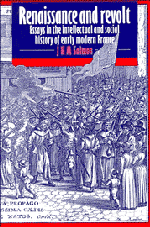Book contents
- Frontmatter
- Contents
- Acknowledgements
- Introduction
- Part I Humanism, stoicism, and interest of state
- Part II Sovereignty, resistance, and Christian obedience
- 5 Bodin and the monarchomachs
- 6 An alternative theory of popular resistance: Buchanan, Rossaeus, and Locke
- 7 Gallicanism and Anglicanism in the age of the Counter-Reformation
- Part III Structures and fissures
- Index
5 - Bodin and the monarchomachs
Published online by Cambridge University Press: 23 December 2009
- Frontmatter
- Contents
- Acknowledgements
- Introduction
- Part I Humanism, stoicism, and interest of state
- Part II Sovereignty, resistance, and Christian obedience
- 5 Bodin and the monarchomachs
- 6 An alternative theory of popular resistance: Buchanan, Rossaeus, and Locke
- 7 Gallicanism and Anglicanism in the age of the Counter-Reformation
- Part III Structures and fissures
- Index
Summary
SEVENTEENTH-CENTURY ASSOCIATIONS
For a century after its first publication in 1576 Bodin's Six Livres de la République occurred in the marginalia of every notable political controversy. But it was not always cited to the same effect. During the turbulent events in mid-seventeenth century England, for example, Bodin's opinions were marshalled to support such a diverse collection of causes as the sovereignty of the Long Parliament, the prerogative of Stuart monarchy, the rights of the Cromwellian army against the parliament, the execution of Charles I, and the defence of Cromwell against the radical elements that had once supported him. In some instances Bodin's views were palpably distorted, and in many others they were set beside those of the Huguenot critics of absolute monarchy, the so-called monarchomachs, whom Bodin had ostensibly set out to refute.
To find the République a bedfellow with Hotman's Francogallia, Beza's De Jure Magistratuum, and Mornay's Vindidae contra Tyrannos is less surprising than it might seem. Within a decade of Bodin's death in 1596 the great jurist Althusius had turned him upon his head, and assimilated his definition of sovereignty to the opposing doctrine of the sovereignty of the community. If sovereignty were to be supreme and indivisible, as Bodin had argued, then its only possible repository must be the whole community. Althusius quoted the monarchomachs in support of the proposition that the community had agreed upon certain fundamental laws as conditions under which the administration and exercise of the rights of sovereignty were entrusted to the ruler.
- Type
- Chapter
- Information
- Renaissance and RevoltEssays in the Intellectual and Social History of Early Modern France, pp. 119 - 135Publisher: Cambridge University PressPrint publication year: 1987



